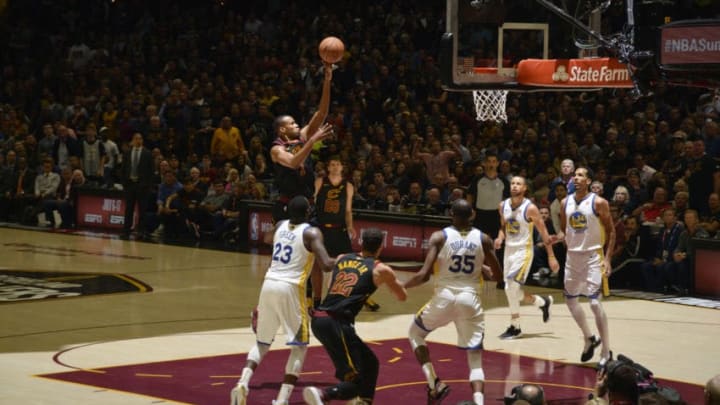The Cleveland Cavaliers and restricted free agent Rodney Hood are negotiating a long-term contract.
News concerning potential deals for restricted free agent Rodney Hood, a player who seems like the final piece of the Cleveland Cavaliers’ post-LeBron rotation, has been scarce.
While that could have meant that the Cleveland Cavaliers were waiting for Hood to sign an offer sheet with a team that they would then match, that doesn’t seem to be the case. According to cleveland.com’s Joe Vardon, the Cavs are actually in the process of negotiating a long-term contract with the 25-year-old swingman.
"Yes, the Cavs are negotiating with Hood, beyond their $3.4 million qualifying offer. They’ve said all summer that Hood is a part of their long-term plans, so it would seem they intend to get something done beyond the QO, which if Hood takes then he becomes an unrestricted free agent next season."
As far as the dollar amount that the two sides could be expected to reach in a new deal, Vardon alludes to the four-year, $52 million deal recently signed by Boston Celtics playmaker Marcus Smart, who was a restricted free agent until Friday.
Zach Lavine and Jabari Parker, two scoring-minded players who entered the summer as restricted free agents, will be getting paid $20 million annually in their new deals.
Though Smart is worlds away a better defender than Hood, Hood is a far better scorer. Though Lavine and Parker have provided a slightly stronger scoring punch over the course of their careers, both have recently recovered from torn ACLs. Hood has yet to have a major injury.
So, that’s what the market value seems to be for Hood: $13-$20 million.
Perhaps there was no baseline for his market value before Smart reached his deal and that’s what further complicated the process but, now, Hood and his agent Travis King have one.
While the Cavaliers have said multiple times that Hood is a part of their future and would match any offer sheet that he signed, signing him outright to a contract as bloated as Lavine and Parker’s seemed unlikely given the way he struggled in the postseason last year.
After averaging 14.7 points per game in the regular season (19.6 points per 36 minutes), Hood only averaged 5.4 points per game (12.6 points per 36 minutes) in the playoffs.
While his touch from behind-the-arc (16.7 percent) was a big reason for his postseason struggles, his timid approach was also problematic. It wasn’t until Game 3 of the 2018 NBA Finals that Hood make his presence felt.
The Cleveland Cavaliers’ coaching staff certainly didn’t help Hood, in the regular season or in the playoffs.
More from Cavs Free Agency
- 4 players the Cavaliers should pursue in 2024 free agency
- These 2 free agents could fill Lamar Stevens’ former role for Cavaliers
- 2 teams that should go after former Cavs forward Lamar Stevens
- Way-too-early buyout candidates for the Cleveland Cavaliers
- How the Cavaliers could afford to sign P.J. Washington
With the way they were using Hood and how little they allowed him to be a playmaker, despite the fact he showed himself to be a dependable iso scorer and pick-and-roll playmaker with the Utah Jazz, it was no wonder that Hood would often seem out-of-rhythm.
When considering that the Chicago Bulls entered the offseason with enough cap space to sign a max contract free agent and the Cavaliers only having enough cap space to use a non-taxpayers mid-level exception after LeBron James signed with the Los Angeles Lakers, there’s even more reason to doubt that the Cavs would go the Bulls’ route in re-signing Hood.
For that reason, establishing a parallel for Hood’s market value this offseason was tough.
Hood is a player who, at 25-years-old and averaging 16.8 points per game (21.8 points per 36 minutes) as a second option prior to being traded to the Cleveland Cavaliers, has All-Star potential.
It’s one of the reasons that players around the NBA pegged him to have a breakout year.
Unfortunately, upon being traded to the Cavs, Hood found himself being used as little more than a catch-and-shoot artist.
On a team, even the Cavs, who would be willing to put the ball in his hands as a second option, Hood would thrive. That seems to be the route the Cavs are going this season, with All-Star power forward Kevin Love becoming the first option for the first time since his days with the Minnesota Timberwolves.
Rookie point guard Collin Sexton will certainly have the ball in his hands to create a fair amount but he and Hood complement each other.
Sexton is a downhill scorer who constantly blitzes the defense. He’s also a shaky shooter from behind-the-arc. Hood is a methodical scorer who will slow down the pace. Though he struggled from three-point range in the postseason, Hood has a career three-point shooting percentage of 36.9.
With a fast-paced attack in transition and egalitarian offense in the halfcourt, it’s not hard to see each of Love, Hood and Sexton averaging 15.0-20.0 points per game next season, even if second-year small forward Cedi Osman takes the expected step forward as a playmaker next season.
Re-signing Hood is imperative if the Cleveland Cavaliers truly want to remain competitive, which it seems they do. There’s no telling how long these negotiations will draw out but if they result in a long-term contract, it’ll certainly be worth the wait.
Related Story: 3 reasons why LeBron should regret leaving the Cavs
*All stats gathered from www.basketball-reference.com
